One of the biggest obstacles in achieving health equity for diverse populations is the lack of diversity in clinical research.
Although gender equity advancements have been made through the inclusion of white women, clinical research lacks diversity, with minimal representation from racial and ethnic minority groups. In the last three decades, older adults, pregnant and lactating individuals, LGBTQIA+ populations, and persons with disabilities have also remained underrepresented – and even excluded – from clinical research (1). It is important to include these diverse groups in medical research to achieve health equity, better understand the progression of different diseases and health conditions, and to transform medicine from a “one-size-fits-all” approach to tailored, individualized care.
The inclusion of diverse groups in health research could facilitate new studies, leading to novel findings or new strategies for the prevention of health conditions and diseases, and help develop precise treatments that can lead to increased quality of life for future generations.
Currently, there may be many diseases and conditions that can progresses differently in people of color, which may lead to misdiagnosis and delayed treatment. For example, eczema is often associated with a red itchy rash, however it may appear as a darker brown, purple, or ashen gray in color among people with brown skin, darker brown skin, black skin, and other darker skin tones (2).
Many barriers hinder underrepresented groups’ participation in clinical research. There is a distrust in formal service providers among diverse communities due to historical neglect and trauma.
Investments in community outreach are needed to reestablish trust within diverse communities and to better facilitate conversations around the role they can play in improving health research. Programs like the All of Us Research Program aim to make these investments to fill the void of research into diverse communities.
About the All of Us Research Program
The purpose of the All of Us Research Program is to transform medicine from a one-size-fits-all approach to more individualized care by collecting health data from one million or more people, creating the largest health database in history regardless of race, ethnicity, gender identity, or sexual orientation.
The program is led by partnerships between the National Institutes of Health (NIH) and organizations representing diverse communities. These partnerships are vital in building relationships with participants and researchers from a range of backgrounds.
The All of Us Research Program is also enrolling researchers interested in conducting studies using All of Us data. Currently, there are more than 3,000 active projects focusing on a variety of health conditions and diseases in diverse communities with the goal to change the future of health.
One Million Participants
The All of Us Research Program provides participants an opportunity to learn about their health and to improve the health of future generations. Currently, the All of Us Research Program has enrolled more than 500,000 participants, with 80% belonging to one or more population that has been historically underrepresented in biomedical research. Participants will be able to get information back about the data they provide which may help them learn more about their own health.
The strength of the All of Us Research Program lies in its intention to re-establish trust amongst diverse populations and building a sense of community. Through partnerships with national, regional, and local organizations, the All of Us Research Program has more than 530 sites collecting samples and measurements across the U.S. These sites also offer participants a chance to meet others in the community and to learn more about their role in shaping health care for future generations.
if you are interested in participating in the All of Us Research Program as a study participant or a researcher, visit https://Joinallofus.org/togetherNYCto learn more!
References:
- National Academies of Sciences, Engineering, and Medicine. 2022. Improving Representation in Clinical Trials and Research: Building Research Equity for Women and Underrepresented Groups. Washington, DC: The National Academies Press. https://doi.org/10.17226/26479.
- https://nationaleczema.org/blog/eczema-in-skin-of-color/

